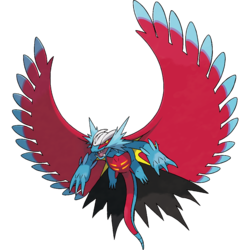From Bulbapedia, the community-driven Pokémon encyclopedia.

|
The subject of this article is a Pokémon which has recently been announced.
This article's contents will change as more information becomes available, perhaps abruptly. Please be cautious when adding information to this article, as rumors and speculation can often be confused with facts. Avoid any information on this subject which is not confirmed by reliable sources.
|
Roaring Moon (Japanese: トドロクツキ Todorokutsuki) is a dual-type Dragon/Dark Paradox Pokémon introduced in Generation IX.
While it is not known to evolve into or from any other Pokémon, it appears to be an ancient relative of Salamence.
Biology
Roaring Moon is a quadrupedal, draconic Pokémon with a long, tapering tail. It is primarily blue with a red underside with four yellow markings. There are red markings on the underside of its tail, and stripes on the inner surface of its hind legs. Additionally, there are raised white ridges above its eyes. Jagged, light blue spikes protrude from either side of its head. Its mouth features sharp teeth, with a pair of three teeth on the upper jaw and a pair of single teeth in the lower. Each of its legs has three, long claws, with its front legs being longer and bulkier, and sporting three protruding scales close to the knees. On its back rests very large red wings that begin with a three-pronged yellow pattern on both sides, that then curl upward into a crescent moon-like shape, with blue-tipped feather-like protrusions on the ends. Below its wings is a jagged cape-like structure with a black underside.
According to paranormal magazine, Roaring Moon is believed to have a connection to Mega Evolution which originated from the Hoenn region.
In the anime
Major appearances
Minor appearances
In the manga
In the TCG
- Main article: Roaring Moon (TCG)
Game data
Pokédex entries
Game locations
| This Pokémon was unavailable prior to Generation IX.
|
|
|
In side games
Held items
Stats
Base stats
| Stat
|
Range
|
| At Lv. 50
|
At Lv. 100
|
105
|
|
165 - 212
|
320 - 414
|
139
|
|
129 - 210
|
254 - 414
|
71
|
|
68 - 135
|
132 - 265
|
55
|
|
54 - 117
|
103 - 229
|
101
|
|
95 - 168
|
186 - 331
|
119
|
|
111 - 188
|
218 - 370
|
Total: 590
|
Other Pokémon with this total
|
- Minimum stats are calculated with 0 EVs, IVs of 0, and (if applicable) a hindering nature.
- Maximum stats are calculated with 252 EVs, IVs of 31, and (if applicable) a helpful nature.
|
Type effectiveness
| Under normal battle conditions in Generation IX, this Pokémon is:
|
|
|
|
|
|
|
|
|
|
|
|
|
Learnset
|
|
|
|
- Bold indicates a move that gets STAB when used by Roaring Moon
- Italic indicates a move that gets STAB only when used by an Evolution of Roaring Moon
|
|
|
|
|
- Bold indicates a move that gets STAB when used by Roaring Moon
- Italic indicates a move that gets STAB only when used by an Evolution or an alternate form of Roaring Moon
|
|
|
|
|
- Moves marked with an asterisk (*) must be chain bred onto Roaring Moon
- Bold indicates a move that gets STAB when used by Roaring Moon
- Italic indicates a move that gets STAB only when used by an Evolution of Roaring Moon
|
Side game data
Evolution
Sprites
Trivia
- Roaring Moon and Iron Valiant can be considered counterparts of one another.
Origin
Name origin
Roaring Moon is literally roaring moon.
Todorokutsuki can be taken literally as 轟く月 todoroku tsuki (roaring moon).
In other languages
| Language
|
Title
|
Meaning
|
 Japanese Japanese
|
トドロクツキ Todorokutsuki
|
From 轟く月 todoroku tsuki
|
 French French
|
Rugit-Lune
|
From rugir and lune
|
 Spanish Spanish
|
Bramaluna
|
From bramar and luna
|
 German German
|
Donnersichel
|
From Donner and Sichel
|
 Italian Italian
|
Lunaruggente
|
From luna and ruggente
|
 Korean Korean
|
고동치는달 Godongchineundal
|
From 고동치는달 godongchineun dal
|
 Mandarin Chinese Mandarin Chinese
|
轟鳴月 / 轰鸣月 Hōngmíngyuè
|
From 轟鳴 / 轰鸣 hōngmíng and 月 yuè
|
 Cantonese Chinese Cantonese Chinese
|
轟鳴月 Gwāngmìhngyuht
|
From 轟鳴 gwāngmìhng and 月 yuht
|
|
|
|
|
|
|
|
Related articles
External links

|
This Pokémon article is part of Project Pokédex, a Bulbapedia project that aims to write comprehensive articles on each Pokémon species, as well as Pokémon groups and forms.
|



